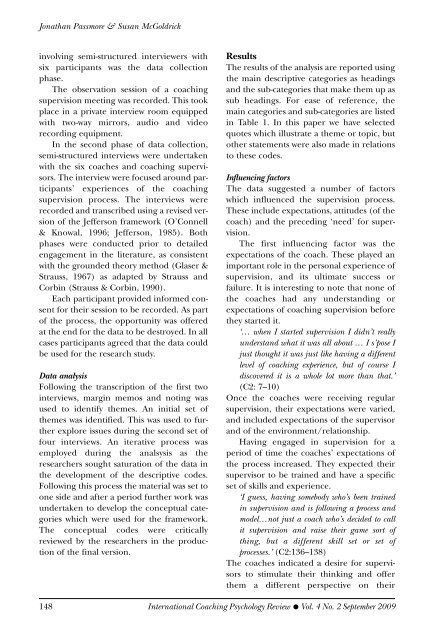International Coaching Psychology Review, 4.2, September 2009
International Coaching Psychology Review, 4.2, September 2009
International Coaching Psychology Review, 4.2, September 2009
Create successful ePaper yourself
Turn your PDF publications into a flip-book with our unique Google optimized e-Paper software.
Jonathan Passmore & Susan McGoldrick<br />
involving semi-structured interviewers with<br />
six participants was the data collection<br />
phase.<br />
The observation session of a coaching<br />
supervision meeting was recorded. This took<br />
place in a private interview room equipped<br />
with two-way mirrors, audio and video<br />
recording equipment.<br />
In the second phase of data collection,<br />
semi-structured interviews were undertaken<br />
with the six coaches and coaching supervisors.<br />
The interview were focused around participants’<br />
experiences of the coaching<br />
supervision process. The interviews were<br />
recorded and transcribed using a revised version<br />
of the Jefferson framework (O’Connell<br />
& Knowal, 1996; Jefferson, 1985). Both<br />
phases were conducted prior to detailed<br />
engagement in the literature, as consistent<br />
with the grounded theory method (Glaser &<br />
Strauss, 1967) as adapted by Strauss and<br />
Corbin (Strauss & Corbin, 1990).<br />
Each participant provided informed consent<br />
for their session to be recorded. As part<br />
of the process, the opportunity was offered<br />
at the end for the data to be destroyed. In all<br />
cases participants agreed that the data could<br />
be used for the research study.<br />
Data analysis<br />
Following the transcription of the first two<br />
interviews, margin memos and noting was<br />
used to identify themes. An initial set of<br />
themes was identified. This was used to further<br />
explore issues during the second set of<br />
four interviews. An iterative process was<br />
employed during the analsysis as the<br />
researchers sought saturation of the data in<br />
the development of the descriptive codes.<br />
Following this process the material was set to<br />
one side and after a period further work was<br />
undertaken to develop the conceptual categories<br />
which were used for the framework.<br />
The conceptual codes were critically<br />
reviewed by the researchers in the production<br />
of the final version.<br />
Results<br />
The results of the analysis are reported using<br />
the main descriptive categories as headings<br />
and the sub-categories that make them up as<br />
sub headings. For ease of reference, the<br />
main categories and sub-categories are listed<br />
in Table 1. In this paper we have selected<br />
quotes which illustrate a theme or topic, but<br />
other statements were also made in relations<br />
to these codes.<br />
Influencing factors<br />
The data suggested a number of factors<br />
which influenced the supervision process.<br />
These include expectations, attitudes (of the<br />
coach) and the preceding ‘need’ for supervision.<br />
The first influencing factor was the<br />
expectations of the coach. These played an<br />
important role in the personal experience of<br />
supervision, and its ultimate success or<br />
failure. It is interesting to note that none of<br />
the coaches had any understanding or<br />
expectations of coaching supervision before<br />
they started it.<br />
‘… when I started supervision I didn’t really<br />
understand what it was all about … I s’pose I<br />
just thought it was just like having a different<br />
level of coaching experience, but of course I<br />
discovered it is a whole lot more than that.’<br />
(C2: 7–10)<br />
Once the coaches were receiving regular<br />
supervision, their expectations were varied,<br />
and included expectations of the supervisor<br />
and of the environment/relationship.<br />
Having engaged in supervision for a<br />
period of time the coaches’ expectations of<br />
the process increased. They expected their<br />
supervisor to be trained and have a specific<br />
set of skills and experience.<br />
‘I guess, having somebody who’s been trained<br />
in supervision and is following a process and<br />
model…not just a coach who’s decided to call<br />
it supervision and raise their game sort of<br />
thing, but a different skill set or set of<br />
processes.’ (C2:136–138)<br />
The coaches indicated a desire for supervisors<br />
to stimulate their thinking and offer<br />
them a different perspective on their<br />
148 <strong>International</strong> <strong>Coaching</strong> <strong>Psychology</strong> <strong>Review</strong> ● Vol. 4 No. 2 <strong>September</strong> <strong>2009</strong>

















